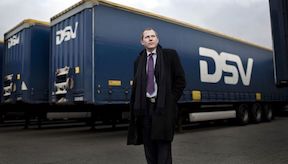Amazon.com Inc. may be about to dramatically reshape the $500 billion freight-forwarding market. But not all businesses it’s competing with will be hit equally hard.
According to the chief executive officer of DSV A/S, the Danish freight forwarder’s use of technology including advanced digital tracking solutions will help it maintain an edge. Meanwhile, competitors that fall behind on technology will suffer, potentially leaving fewer players in the market.

“The competitive landscape is changing, but we’re hoping that it will play in our favor,” DSV CEO Jens Bjorn Andersen said in an interview.
His freight-forwarding business is the world’s fifth-biggest, controlling about 2 percent of the global market. “Our customers make increasingly larger demands of us when it comes to transparency, track-and-trace and digital solutions,” Andersen said. “Some of our competitors can’t deliver those services to the same extent that we can. This will be a competitive advantage.”
DSV, which is based west of Denmark’s capital Copenhagen, made more than 65 million electronic customer transactions last quarter. More than 80 percent of its bookings occur electronically, compared to 10 percent just a few years ago, Andersen says.
Seattle-based retail giant Amazon is testing its own delivery network, and may take away business from long-time partners United Parcel Service Inc. and FedEx Corp. “We’re monitoring this development very closely,” the DSV CEO said. “It’s obvious that Amazon will be able to take a slice.”
Amazon may hurt DSV’s growth within retail deliveries, which will be a blow that the Danish company “will take on the chin,” the CEO said. He says it’s unlikely that the U.S. retail behemoth will target a bigger chunk of the freight-forwarding market.
But the threat’s not just coming from Amazon. Copenhagen-based A.P. Moller-Maersk A/S, the world’s largest shipping line, is working on a new strategy that will make it an end-to-end deliverer of containerized goods, boosting its freight-forwarding unit in the process.
Andersen says freight forwarders smaller than his company are in a tougher situation as they figure out how to compete with giants like Amazon and Maersk. But he says DSV is big enough to cope with the disruption.
“I don’t want to sound arrogant, but it’s a fact that we’re one of the biggest players in the market and we need to use that potential,” Andersen said.
DSV was founded in the late 1970s. It has a market value today of $15 billion and 47,000 employees.
“I’ll happily admit that I can become very uneasy about Amazon, about the container lines, about start-ups or about the two teenagers in a basement in California who may have invented something we missed,” Andersen said. “But then another quarter has passed and we have delivered with growth on all our key parameters.”









